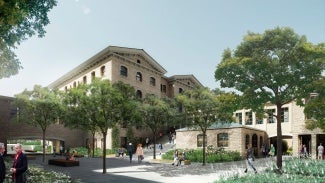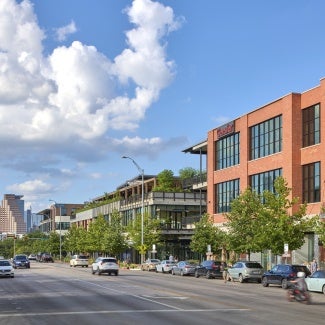Regional & Urban Design Award
Recognizes the best in urban design, regional and city planning, and community development.

The 2026 submission period for this award is now closed, with public announcement of the next recipient anticipated in June 2026. Until then, join us in recognizing architectural excellence among the recent recipients of this and other prestigious AIA national awards.
Recognizing the best in urban design
Buildings never arise in isolation. The best planning accounts for the entire built environment, local culture, and available resources—modeling architecture’s promise and true value to communities.
The Regional & Urban Design Award recognizes the best in urban design, regional and city planning, and community development.
Questions? Email AIA Awards
Entrants
- All entries must identify an AIA Architect member in good standing (e.g. current on dues, no ethical violations) that is licensed to practice in the U.S. affiliated with the project to serve as the project Submitting Architect.
- The Submitting Architect does not have to be the head of the project team.
- Owners, individual practitioners, private design firms, public agencies, civic organizations, and public interest groups can submit projects or programs in which they were involved.
- Projects must credit every substantial contributor.
Projects
- Individual buildings are not eligible.
- Urban design projects, planning programs, civic improvements, campus plans, environmental programs, redevelopment projects, or other similar projects and programs may be entered.
- Projects may be located anywhere in the world but must have been designed by a U.S. licensed architect.
- Incomplete or ongoing projects or programs may be entered if a significant portion has been completed, implemented, or adopted by a local jurisdiction or authority.
- If complete, projects must have been completed after January 1, 2020.
Fee
All entry fees are non-refundable. Entry includes a $450 fee for a single project submission to a single project-based award program, and $100 for additional submissions of the same project to other project-based award programs.
026 Deadline
Submissions are due by 5pm ET on Thursday, November 13, 2025. All materials must be submitted via the online application portal (i.e., cannot be accepted via email, phone, shared online drive, fax, post, etc.) by the prescribed deadline(s): deadline extension or exception requests will not be granted. Applicants and interested parties are encouraged to seek award assistance well in advance of application deadlines to minimize the risk for ineligibility and/or application noncompliance, rendering the entry removed from review.
Formatting requirements
For information on templates for required uploaded forms (e.g., Image Release Form, Application Release Form, Client Authorization, etc.), please visit the AIA Awards FAQ webpage.
Applications that do not conform to the program's formatting requirements for uploaded materials (e.g., required forms, images, and portfolio documents) are subject to automatic disqualification. AIA does not accept release forms with altered terms.
Application components
The AIA online application portal houses extensive information on the materials required to submit an application. Please refer to this portal when the program receives materials for the 2026 season.
Review process
- AIA Awards juries will be shared on AIA.org once available.
- Award advisory panels are composed of individual experts recommended to and appointed by the AIA President, to adhere to composition requirements outlined in the AIA Rules of the Board.
- All policy and application compliant entries are evaluated by a uniform rubric.
- Jurors review submissions independently, then convene collectively to discuss submissions and select recipients.
- Contact from award applicants and/or their supporters (e.g., nominator, letter of reference writer, mentor, mentee, employer, etc.) to the real or potential jurors presiding over the review of an AIA award program is strictly prohibited.
- Evidence of current or future applicants and/or their supporters attempting or actualizing contact with an AIA award juror(s) pertaining to the evaluation of applications to specific award programs within specific award cycles can result in an official filing with the AIA Ethics Committee, suspension of membership in good standing, ineligibility of involved parties from participation in current and/or future AIA award program participation, and/or additional measures.
Review criteria
- Entries are evaluated based on how successfully projects met their individual requirements.
- All projects must demonstrate design achievement, including a sense of place and purpose, of ecology and environmental sustainability, and of history.
- Design achievement can be evidenced by the exploration of new approaches to ecological planning, urban form, or sensitive reinforcement of successful historical development patterns.
- Entries should integrate the engagement of ecological issues by describing (preferably with graphics) how the design addresses the ‘triple bottom line’—i.e. providing holistic solutions that simultaneously address environmental, social, and economic criteria. These include strategies that capture, collect, store, and distribute resident renewable resources and energies while enhancing the quality of life and promoting social equity.
- Entries may also exhibit improvements in the quality of life, the environment, and/or the technical advancement of urban systems.
- In 2019, AIA adopted the Framework for Design Excellence as the set of guidelines and requirements to assess project performance. Climate action requires a holistic approach addressing the interdependence among people, buildings, infrastructure, and the environment. The Framework for Design Excellence provides the elements that support this vision during project evaluation. While projects submitted do not need to address all the measures included in the framework, they do need to highlight how they perform in this context and highlight relevant narratives and metrics when applicable.
Recognition
Recognition for this program typically includes the following elements but may be subject to change. Recipients will receive additional information about this cycle’s recognition benefits with their selection notification.
- Promotional recognition in AIA communication channels.
- Invitation for the recipient or a recipient representative to attend selected awards event celebrations, commonly held during the annual AIA Conference on Architecture & Design®.


